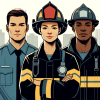As we all know, becoming a firefighter or medic isn’t all about the brawn, it’s also about the brains. We decided to go to our Facebook fans to learn from their testing experiences and asked them to share their tips and tricks on how to study for the EMT final exam. Here are some of the best pieces of advice we got:
1.The best way to study is to study the entire time you’re in training! Don’t leave it to the last minute. Read, read, read, practice, practice, practice, and ask questions! - Andrew Hamilton
2.Study groups with people in your class, practicals with each other and study notes together. Great fun and effective. - Alex Vaughan
3.Get a study guide and do the questions in the guide religiously. If you miss an answer, look up the correct one and mark it down. Throughout the class, take a few minutes each day to go over the old study questions. Review all at the end of the class prior to testing. - Craig Hacker
4.Flash cards. I passed my NREMT yesterday morning. Trust me it’s flash cards. Heart rates and arrhythmias,shock symptoms and types, acute abdominal symptoms and possible causes, you name it. Write them down, go through them, and separate the wrong ones from the correct, then go through and do the wrong ones over and do the same thing with them until you whittle the pile down to nothing, then start over. - Cameron Greer
5.Be honest with your self and dig into the topics you feel most uncomfortable with. - Brian Jersey Guenther
6.The best way to study is by doing hands on training with fellow EMTs and paramedics. Have them quiz you for your practical. As for the information, make posters for your house so you see them while doing daily activities, such as in the bathroom having a poster listing different drugs and uses and in the kitchen having a list of different vitals and such. - Tiffany Strayer
7.Don’t overthink it, read the chapters you feel uncomfortable with over again. You should know the answers without memorizing them. If not, you may not be ready to be an EMT. There is no study guide in the field. - Darrel House
8.Go to your chapter and place an “x” next to everything that you definitely know, then put a check mark next to the things that you are semi sure that you know and finally place a mark next to the things that you definitely do NOT know. This cuts down the study time. Don’t bother studing things that you already know, if you study the things that you are semi sure of you will have at least 70 percent on a test. Study the things that you definitely do not know. This will give you another 10 to 15 percent of knowledge. This system works try it. - L Sydney Peck
9.Before my final class exam I read and reread my textbook, workbook, notes and past tests. I committed to memory what had tripped me up. I hit it hard for about a week and then the day before the exam, I broke away from the books and went fishing completely by myself. I wanted a few hours as “Frank” not as “EMT Student Johnson”. I sat under a tree, drank my thermos of coffee and watched my bobber do nothing. Why didn’t it do anything? I hadn’t even bothered buying any bait. I just reconnected with the world that I had pushed aside while I was in school. When I came home, I was focused, relaxed, and ready to give my best effort. I looked at my book very briefly and that was it. And I passed with no problems. - Frank Johnson
10.The other component to passing the written test that I think is being overlooked is active participation in the practical evolutions. Be first. Volunteer. Participating in the practical skills evolutions makes a stronger mental connection to the theory. - Alex Litchfield












